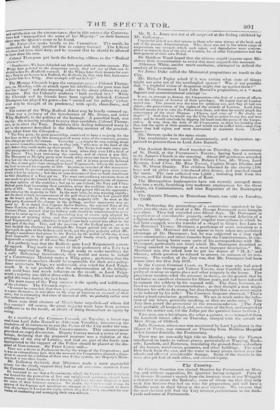At a fleeting of the Common Comma, on Tuesday, a
letter was read from Lord John Russell to Aldernian Venables, announcing the resolution of Government to put the Police of the City under the con- trol of the Metropolitan Police Commissioners. This announcement provoked an angry discussion. Deputy Conley moved a series of reso- lutions, declaring that the proposed measure was a violation of the privileges of the city of Londoa, and that no part of the funds now appropriated to the support of the Police should be placed at the dis- posal of Government. Sir Peter Laurie said-
. There was a desire in Parliament to clip the wings of the Corporation; and it was an tstramdintay fact, that the moment the Corporation showed a dispo- sition to amend the condition of their own Police system, her Majesty's Minis- ters took it into their hands.
11r. Galloway declared, that 'Ministers made a most ungrateful return for the steady support they had out all occasions received flout the Common Council
He lamented to see that a Government, which the Court was led to believe was formed for the promotion of flee and enlightened measures, should have recently turned their barks on their friends, and have tltrotvo thentselv..s into
the arum of their bitterest enmities. No doubt, the Cool t st imp its Opinion of the flagrant and mischievous attempt of C ccl ainent to wrest from the citizens of Loedun the u ight, which they bad wis, ly exercised for ern- Units, of conducting and managiag their own defence. Mr. R. L. Jones was not at all surprised at the feeling exhibited by Mr. Galloway_ Ungrateful indeed was that return to those who were always at the beck and call of the present Administration. Why, there was not in the whole range of corporations one towards which such injurv and degradation were Lantern- plated as towards that of the city of London, .for ail other Corporations had the management of their own Police.
Sir Matthew Wood hoped that the citizens would impress upon Mi- nisters their determination to resist this most unjustifiable measure. Alderman White, amidst much confusion, attempted to defend the conduct of Government.
Sir James Duke called the Ministerial propositions an insult to the City.
Mr. Richard Taylor asked if it was certain what state of things might not arise out of the newfangled system ? Was it not possible that " a frightful vision of despotism might rise up against them?" Mr. Wire denounced Lord John Russell's proposition, as a " most. flagrant and unconstitutional attempt "—
It was an attempt to destroy the Corporation—the first of a series of efforts to rob the citizens of London of their privileges. lk hoped that all London woul4 rise. The present was the time for speaking omit, and they all had one object—the preservation of the rights of the citizens of London. Lord John Russell meant first to take the Police from them, and then he would attack the conservancy of the river Thames. (Cheers, and cries of " No doubt, no doubt ") And then he would say the City had no police to pay for, and W38 rich; and he would conclude by dipping his band into the poise of the Corpo- ration. It was, then, the duty of the Corporation to show Iris lordship that they had the spirit of their ancestors, and would not be trifled with—that they knew they had rights, and were determined to maintain them. (Loud cheers.)
Mr. Stevens spoke in the same strain.
The resolutions were carried unanimously, and a deputation ap- pointed to present them to Lord John Russell.


























 Previous page
Previous page